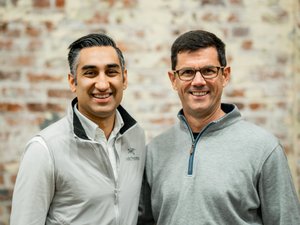
When Chris Rivers (left) began formulating the idea for Optimis, the concept was simple: Help companies and investors get more efficient in how they manage interest rate risk.
So Rivers designed his product to be simple, too: It’s a customizable (and cost-effective) financial solution to manage interest rate risk for companies, banks and investors. The platform gives companies access to proprietary interest rate products to control risk without the cost or burden of interest rate derivatives.
“Even though bonds help companies borrow money from investors, bonds don’t manage risk for companies and investors. So the [problem] is interest rate risk,” Rivers clarifies.
In the bond markets, investors balance their interest rate risk by turning to interest rate derivatives as a risk-transfer vehicle.
“The issue is the risk-transfer products. Companies’ investors spend $30 billion a year on these products,” says Rivers. “[So] the bond market is inefficient in how it raises money and how it manages risk.”
With years of experience in investment banking, bond investing and mortgage banking, and a dual degree in finance and psychology, Rivers identified the core issue of interest rate risk through one of his university courses. He developed his own formula in support of his theory of how to deal with the risk.
He contemplated publishing his findings as his final senior project, but after bouncing his logic and formula against one of his professors, he was encouraged to turn it into a revenue-generating product.
“This is a financial product that will be transformative for people, processes and systems,” Rivers said. “It has implications in how you borrow money, manage risk and analyze your results.”
Rivers met his technical co-founder, Cedric Tucker (right), as teammates in an intramural basketball league. Tucker brings more than 24 years in systems engineering to the table with companies such as TIAA, SunGard and Bank of America.
Their risk-management platform gives companies that use bonds to raise money from investors a way to offer risk-mitigated bonds. This new financial platform eliminates both a company’s and an investor’s need to use — and pay for — risk-transfer products.
“Optimis allows companies to raise capital from investors using a bond while the bond itself manages the risk,” Rivers explains.
The platform also incorporates analytics for companies and investors to leverage so they can make better investment decisions.
“We want companies to be smarter about the cost of their capital and [to find] more efficient ways of using that,” Rivers adds.
The duo has been bootstrapping Optimis for two and a half years, with Rivers dedicating his efforts full-time to move the project forward. They spent almost a year working on their IP strategy, with another year interfacing with potential clients and customers to get feedback. At the start of this year, Rivers and Tucker joined the QC Fintech program. The program allowed the Optimis team to broaden its network and to gain access to ideal clients.
They have already begun meeting with potential clients to discuss the project, including the SEC and major banks such as JP Morgan Chase. That initial outreach has provided positive feedback, hailing it as a disruptive solution in the current the finance landscape.
Optimis, along with the rest of the QC Fintech class, will wrap up their accelerator experience by presenting at the Queen City Fintech Demo Day on June 13.
Rivers said the biggest struggle to date has been breaking into a startup scene that is still in its infancy.
“You see certain types of startups are celebrated and others don’t get the attention,” he said. “Our challenge has been to create an environment where people understand the unique opportunities in Charlotte in the financial and technology sectors. It’s young. It hasn’t shaped an identity yet, and an important part of our growth will be supporting these startups coming in — not just big businesses.”
For startup founders looking to break into the scene, Rivers reiterates the importance of doing your homework.
“Know your problem to the core. See what others are doing to fix that problem. And then demonstrate definitively why you’re different,” he states. “Then begin sharing your story and product with people because you have something to stand on.”
This story was co-authored by David Stunja and Lexie Banks.
For more stories like this, subscribe to StartCharlotte’s free weekly startup newsletter.








